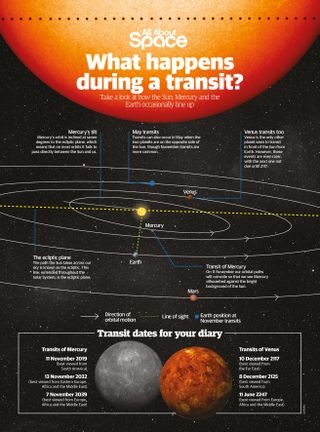The planet Mercury is going to cross across the sun today (from Earth's perspective) starting at 7:34 a.m. EST (12:34 p.m. GMT). Below is your guide to watch the seminal event safely and with fun.
The event, a rare transit of Mercury, will take about 5.5 hours and it's worth making the time to watch at least some of it, since the next time such an event will happen will be 2032. The event is visible in the Americas, the Atlantic and Pacific oceans, New Zealand, Europe, Africa and western Asia. If you can't catch it due to clouds, location or scheduling issues, you can always look at it online.
NASA has a master list of astronomy clubs across the country that will host local events. These events are a great spot to safely view the sun using specially equipped telescopes. NEVER look at the sun without protective equipment – even for a few moments. You will need special solar glasses for your eyes, and special filters for your binoculars or telescope. Here's a guide of the gear you will need to observe the Mercury transit.

Mercury transits are rare celestial events. Here's a look at how they happen and why.
(Image credit: Future Plc/All About Space Magazine)
According to Space.com's skywatching columnist Joe Rao, you will need a magnification of at least 50x to see the planet on the sun's surface, since Mercury is only about 1/194th the diameter of the sun.
Mercury will appear darker than any sunspots on the surface of the sun, although the surface has remained relatively clear in recent days because the sun is in a quieter period in its 11-year cycle. Rao also has a timetable of transit events and a weather forecast available for several areas of the United States to help you decide your skywatching schedule.
| UTC | EST | CST | MST | PST | |
|---|---|---|---|---|---|
| Contact I | 12:35 | 7:35 a.m. | Not visible | Not visible | Not visible |
| Contact II | 12:37 | 7:37 a.m. | Not visible | Not visible | Not visible |
| Greatest | 15:19 | 10:19 a.m. | 9:19 a.m. | 8:19 a.m. | 7:19 a.m. |
| Contact III | 18:02 | 1:02 p.m. | 12:02 p.m. | 11:02 a.m. | 10:02 a.m. |
| Contact IV | 18:04 | 1:04 p.m. | 12:04 p.m. | 11:04 a.m. | 10:04 a.m. |
If you can't catch the event in person, there are several livestreams (or webcasts that are nearly live) that will allow you see the transit on the Internet, completely safely. NASA's Solar Dynamics Observatory will post several videos, and both Slooh and The Virtual Telescope Project will host livestreams from their respective observatories in the Canary Islands and Rome. More details on how to find these livestreams can be found here.
We'd also love to see your best photos or videos of the event. Feel free to share what you do with us on at spacephotos@space.com. We may feature your multimedia in a future Space.com story.
Today's event will be the fourth of 14 transits that Mercury will have during the 21st century, so make sure to tune into this historic event.
Follow Elizabeth Howell on Twitter @howellspace. Follow us on Twitter @Spacedotcom and on Facebook.

Need more space? Subscribe to our sister title "All About Space" Magazine for the latest amazing news from the final frontier!
(Image credit: All About Space)
https://www.space.com/mercury-transit-2019-last-until-2032.html
2019-11-11 09:12:00Z
CBMiP2h0dHBzOi8vd3d3LnNwYWNlLmNvbS9tZXJjdXJ5LXRyYW5zaXQtMjAxOS1sYXN0LXVudGlsLTIwMzIuaHRtbNIBQ2h0dHBzOi8vd3d3LnNwYWNlLmNvbS9hbXAvbWVyY3VyeS10cmFuc2l0LTIwMTktbGFzdC11bnRpbC0yMDMyLmh0bWw
Bagikan Berita Ini














0 Response to "Rare Transit of the Mercury, the Last Until 2032, Occurs Today! Here's What to Expect - Space.com"
Post a Comment